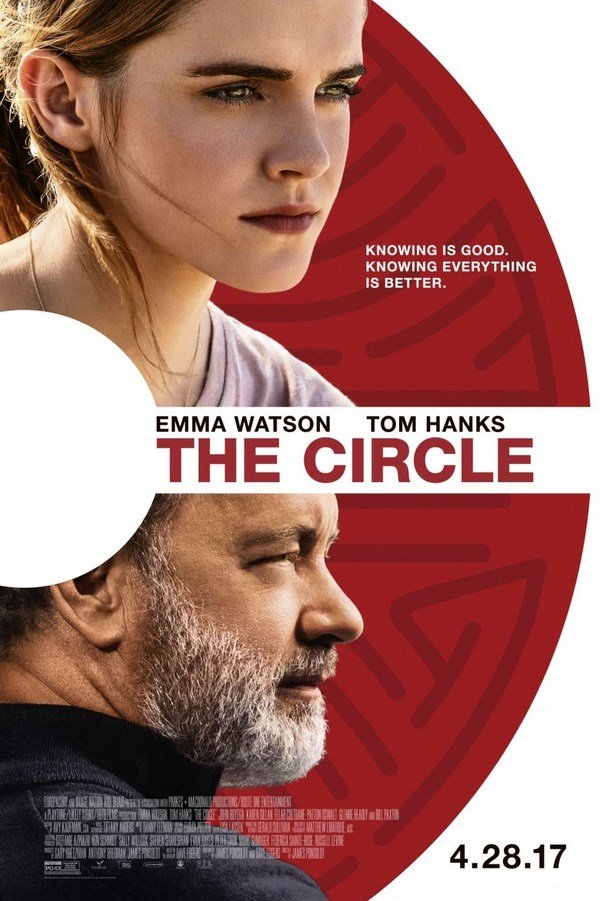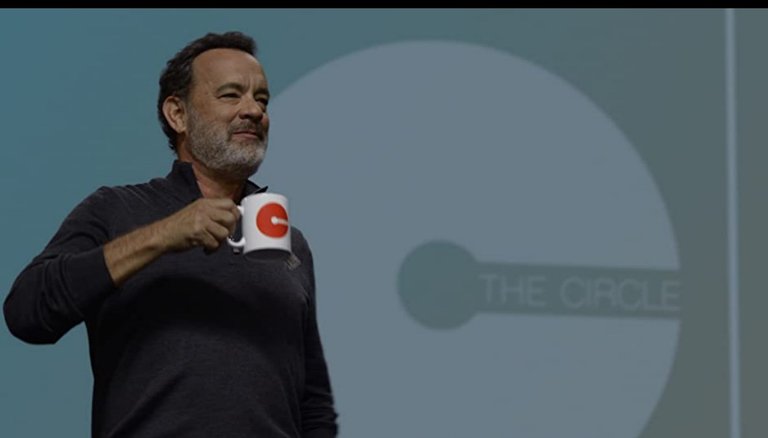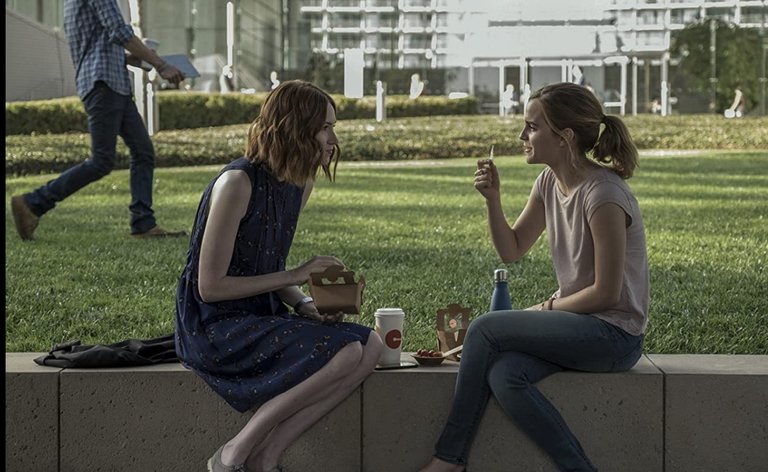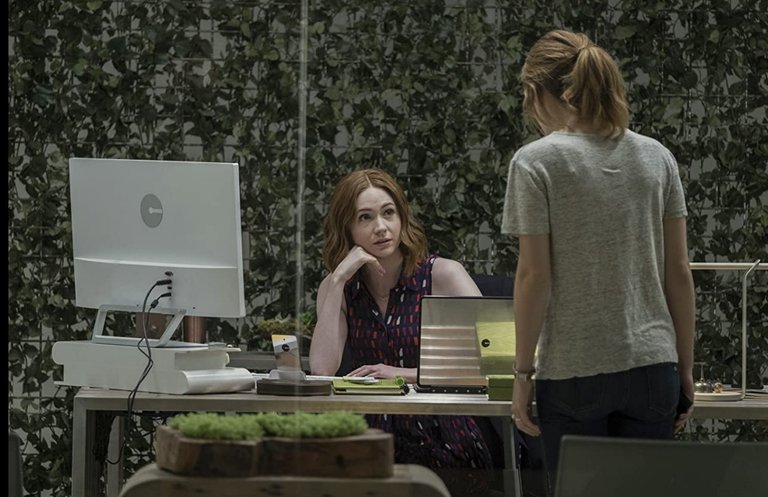The Circle with Tom Hanks is an excellent reflection on privacy and social networks. / El Círculo con Tom Hanks es una excelente reflexión sobre la privacidad y las redes sociales. [ENG/ESP]

The Circle is an excellent reflection that warns about the dangers of exaggerated exposure on social networks in a (future?) world marked by virtuality.
It is based on the book of the same title by Dave Eggers, published in 2013.
It is a film that, despite having some gaps, is very easy to digest and does not become heavy, especially considering that it is a science fiction story, nothing exaggerated if compared to a future perhaps not too distant and very realistic at the same time that forces you to think and rethink many aspects of the internet, social networks, an exaggerated exposure to the limit of the annulment of privacy and the new technologies that are being implemented daily in this aspect.


Like any science fiction novel (a literary genre in which Eggers is not a master but manages to navigate the path without too many stumbles) The Circle starts initially with an imaginary society based in San Francisco Bay which in reality aims to enclose and dominate that small society, then the whole world, in a physical and virtual universe whose limits and confines are increasingly disappearing until they are totally abhorred by each other.
It may seem exaggerated but many of the stories of the masters of science fiction such as Orwell, Bradbury, Matheson and so many others proved after a few years that the distance between reality and fiction is sometimes not as abysmal as one might think. And even more so in these modern times dominated by technology.
The central characters are Mae Holland (played by Emma Watson) and Eamon Bailey (played by Tom Hanks).
The former is a kayak-loving sportswoman who works in the call centre of the company that supplies the city with drinking water.
Bailey, one of the two founding partners of an enigmatic company called The Circle, holds a conference for all employees at which he shows off his company's new products, in particular the Circle Video Delivery, which is nothing more than a very small ultra-high definition camera that can be easily hidden anywhere on the body, and which allows the recorded images to be sent immediately around the world.
The company begins to recruit staff, including Mae's friend Annie, who manages to convince her to do an interview.
Once she passes the interview, she is hired as the company's receptionist and her place of work is, to say the least, paradisiacal: a university-style campus, places to relax, gyms, luxury and comfort all over the place. Obviously Mae's work is supervised and controlled through the opinion of the company's clients who cast their vote.
Already the first dilemma begins to arise: comfort, luxury and well-being at the expense of privacy or the simplicity of the former life, perhaps austere, but with total freedom?
Faced with this dilemma, she plans to spend a weekend with her parents kayaking on the lake, trying to escape the pressure she is under.
When she returns to work, she is severely reprimanded by her superiors because she should never do any activity alone (she had gone kayaking on her own for a couple of hours) and much less isolate herself. In other words, every activity she does, even the most intimate ones, must be in close contact with all the millions in the huge social network that El Círculo has built behind the façade of a public utilities company.
In short, a kind of Big Brother on a universal level.
On one occasion, while kayaking, her boat capsizes and she is in danger of drowning. She was saved thanks to two drones that were monitoring her and raised the alarm. She is alive thanks to them. That is the message. Even if she has to sacrifice her privacy.
The society's programme is much more ambitious. Mae is to present at a press conference the launch of a new device: Soul Search, a programme in which a person's name can be typed in and through this algorithm intercepted, monitored and filmed.
The product initially reaches a consensus because it can stop a murderer, but in reality that is not its objective, but rather to potentially control as many people as it wants, introducing a product with lethal power to the market.
Mae realises that the only way to expose Bailey is to convince him to wear the device strapped to his chest to set an example to others. But in reality she plans with Kalden, the young creator of the social network The Circle who knows what a monstrous virtual creature he has created, to send all the emails of both partners - where they tell of their real ambitions - to millions of users around the world.
On discovering the hoax, Bailey and Stanton - the two partners - cut the power to prevent the transmission of the messages, but in reality they continue to multiply using the cellular network that Kalden had planned for such an emergency.
Mae takes the transmission in hand, announces that those responsible will be severely punished and promises substantial changes in The Circle.
The ending is one of the most interesting parts of the film. Mae navigating alone in the kayak joins all the drones circulating in space (probably through the SeeChange system that was part of the social network, demonstrating (and this is a personal opinion) that - although the project has been shut down and those responsible imprisoned - the problem of privacy is not really solved and we are forced to live in a world in which we must share our lives on the social networks.


Emma Watson as Mae Holland
Tom Hanks as Eamon Bailey
Amir Talai as Matt
Bill Paxton as Vinnie Holland
Ellar Coltrane as Mercer Regalado
Glenne Headly as Bonnie Holland
John Boyega as Kalden
Karen Gillan as Annie Allerton
Nate Corddry as Dan
Patton Oswalt as Tom Stenton
Poorna Jagannatha as Dra. Jessica Villalobos

The message of the film is that by sharing the privacy of our lives, something that until recently was a real treasure, we run the risk of becoming real media zombies.
This is what Mae ends up becoming (or not?) with this open ending, losing even the ability to distinguish - not only socially but also politically and economically - what is morally correct and what is not.
However, some argue that this "alternative personality" that many users display on social networks allows them to express facts and things that they would not dare to confess in a familiar environment, it allows them to be themselves.
In short, they have created a virtual world in which privacy has no place, governed by parameters that they themselves have created.
The end of the film does not offer a solution, nor does it have a double standard. It is simply that everyone must evaluate the risks they run if they take on this kind of double identity.

El Círculo es una excelente reflexión que advierte sobre los peligros de la exagerada exposición en redes sociales en un mundo (futuro?) marcado por la virtualidad.
Está basada en el libro de Dave Eggers con el título homónimo publicado en el año 2013.
Es una película que, a pesar de presentar algunas lagunas, se digiere muy bien y no se hace pesada, teniendo en cuenta especialmente que se trata de un relato de ciencia ficción, nada exagerado si se compara con un futuro tal nez no demasiado lejano y muy realista a la vez que te obliga a pensar y a replantearte muchos aspectos de internet, las redes sociales, una exagerada exposición al límite de la anulación de la privacidad y las nuevas tecnologías que se están implementando diariamente en ese aspecto.

Como toda novela de ciencia ficción (género literario en el cuál Eggers no es un maestro pero logra recorrer el camino sin demasiados tropiezos) El Círculo parte inicialmente con una sociedad imaginaria con sede en la Bahía de San Francisco que en realidad tiene como objetivo encerrar y dominar esa pequeña sociedad, después el mundo entero, en un universo físico y virtual cuyos límites y confines cada vez van desapareciendo más hasta ser totalmente aborbidos el uno por el otro.
Tal vez parezca exagerado pero muchos de los relatos de los maestros de la ciencia ficción como Orwell, Bradbury, Matheson y tantos otros demostraron después de algunos años que la distancia entre realidad y ficción a veces no es tan abismal como se cree. Y mucho más en estos tiempos modernos dominados por la tecnología.
Los personajes centrales son Mae Holland (interpretada por Emma Watson) y Eamon Bailey (interpretado por Tom Hanks).
La primera es una deportista amante del kayak que trabaja en el centro de llamadas de la compañia que abastece de agua potable a la ciudad.
Bailey uno de los dos socios fundadores de una enigmática compañia llamada The Circle, celebra una conferencia para todos los empleados en la que muestra los nuevos productos de su sociedad, en particular el Circle Video Delivery que no es otra cosa que una cámara de ultra alta definición muy pequeña, que se puede esconder fácilmente en cualquier parte del cuerpo, y que permite enviar inmediatamente las imágenes grabadas a todo el mundo.
La sociedad comienza a reclutar personal entre los que se encuentra Annie, amiga de Mae, quien logra convencerla para que realice una entrevista.
Superada la misma es contratada como recepcionista de la empresa y su lugar de trabajo es a decir poco paradisíaco: campus estilo universidad , lugares de descando, gimnasios, lujo y confort por todos lados. Obviamente el trabajo de Mae es supervisado y controlado a través de la opinión de los clientes de la compañia que emiten su voto.
Ya el primer dilema comienza a plantearse: confort, lujos y binestar a costa de la privacidad o la sencillez de la vida anterior, tal vez austera, pero con total libertad?
Ante esta disyuntiva planea pasar un fin de semana con sus padres haciendo kayak en el lago tratando de abstraerse a la presión a que es sometida.
Cuando regresa a su trabajo es reprendida seramente por sus superiores porque nunca debería practicar ninguna actividad sola (había ido a hacer kayak en solitaria por un par de horas) y mucho menos aislarse. Es decir, cada actividad que realice, aún las más intimas debe estar en estrecho contacto con todos los millones de la enorme red social que El Círculo ha construído detrás de la fachada de una empresa de servicios públicos.
En definitiva una especie de Gran Hermano a nivel universal.
Incluso en una oportunidad practicando kayak se le da vuelta el bote y corre peligro de ahogarse. Es salvada gracias a dos drones que la monitoreaban en continuación y dan la alarma. Está vida gracias a ellos. Ese es el mensaje. Aunque deba sacrificar su privacidad.
El programa de la sociedad es mucho más ambicioso. Mae debe presentar en una conferencia de prensa el lanzamiento del nuevo dispositivo: Soul Search, un programa en el cuél se puede escribir el nombre de una persona y a través de este algoritmo interceptarla, vigilarla y filmarla.
El producto inicialmente alcanza un consenso porque gracias a él se logra detener a una asesina pero en realidad ese no es su objetivo sino el de controlar potencialmente a todas las personas que se desee, introduciendo en el mercado un producto con un poder letal.
Mae se da cuenta que la única manera de desenmascarar a Bailey es convenciédolo a llevar el dispositivo atado el pecho para dar ejemplo a los demás. Pero en realidad planea con Kalden, el joven creador de la red social El Círculo que sabe la monstruosa criatura virtual que ha creado, enviar todos los correos electrónicos de ambos socios -donde cuentan sus reales ambiciones- a los millones de usuarios de todo el mundo.
Al descubrir el engaño Bailey y Stanton -los dos socios- cortan la corriente para impedir la transmisión de los mensajes, pero en realidad éstos continúan a multiplicarse usando la red de celulares que Kalden había previsto para una emergencia de este tipo.
Mae toma en mano la transmisión, comunica que los responsables serón severamente penados y promete sustanciales cambios en El Círculo.
El final es una de las partes más interesantes de la película. Mae navegando en solitaria con el kayak se une a todos los drones que circulan en el espacio (probablemente a través de sistema SeeChange que hacía parte de la red social, demostrando talez (y esta es una opinion personal) que -a pesar de que el proyecto ha sido cerrado y sus responsables encarcelados en realidad el problema de la privacidad no queda mínimamente resuelto y quedamos obligados a vivir en un mundo en el cuál debemos compartir nuestra vida en las redes sociales.


Emma Watson como Mae Holland
Tom Hanks como Eamon Bailey
Amir Talai como Matt
Bill Paxton como Vinnie Holland
Ellar Coltrane como Mercer Regalado
Glenne Headly como Bonnie Holland
John Boyega como Kalden
Karen Gillan como Annie Allerton
Nate Corddry como Dan
Patton Oswalt como Tom Stenton
Poorna Jagannatha como Dra. Jessica Villalobos

El mensaje de la película es que, compartiendo la privacidad de nuestra vida, algo que hasta hace poco tiempo era un verdadero tesoro, corremos el riesgo de transformarnos en verdaderos zombies mediáticos.
Es en lo que termina transformándose (o no?) Mae con ese final abierto perdiendo incluso la capacidad de distinguir -no solo a nivel social sino también polítuco y económico- lo que es moralmente correcto y aquello que no lo es.
Sin embargo hay quienes sostienen que esta "personalidad alternativa" que muchos usuarios despliegan en las redes sociales les permite expresar hechos y cosas que no se atreverían a confesar en el ambiente familiar, les permite ser ellos mismos.
En definitiva han creado un mundo virtual en el cuál la privacidad no tiene cabida gobernado por parámetros que ellos mismos han creado.
El final de la película no ofrece una solución, ni tiene una doble moralidad. Simplemente cada uno deberá evaluar los riesgos que corre si asume esta especie de doble identidad.


Gracias por el apoyo a mis contenidos @fridakahlo y @cervantes.